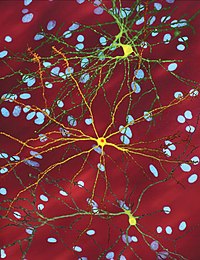
Photo from wikipedia
Abstract Objective: To survey neurologists and obtain clinical perceptions of tetrabenazine for the treatment of chorea in patients with Huntington disease (HD). Methods: Board-certified/board-eligible neurologists, in practice for ≥5 years,… Click to show full abstract
Abstract Objective: To survey neurologists and obtain clinical perceptions of tetrabenazine for the treatment of chorea in patients with Huntington disease (HD). Methods: Board-certified/board-eligible neurologists, in practice for ≥5 years, who had treated treat ≥3 HD patients in the past 2 years, were recruited from an online physician panel to participate in a cross-sectional, web-based survey. Respondents provided information about themselves, their practice, approaches to HD chorea management and perceptions of available treatments. Results: Two hundred neurologists responded to the survey. Based on clinician responses, the most common reasons to treat chorea are impairment in activities of daily living (54%) and quality of life (41%). Although tetrabenazine was the only approved treatment for chorea in HD patients at the time of this analysis, it was only prescribed to ∼50% of patients with HD-related chorea. More than half of physicians perceive tetrabenazine as having minimal or no effectiveness in improving chorea. More than 40% of physicians consider tetrabenazine to be a non-optimal treatment, and 51% of physicians agree that they are unable to titrate to efficacious doses due to adverse side effects or tolerability concerns. Physicians report that side effects leading to dose interruptions (33%) and reductions (30%) occur in their patients “often” or “almost always”. The most common side effects that led to insufficient dosing and disruptions in titration were sedation and somnolence (41%), depression (24%) and anxiety (22%). Conclusions: Many physicians who treat HD-related chorea report that tolerability issues with tetrabenazine impact their ability to effectively use tetrabenazine in their clinical practice.
Journal Title: Current Medical Research and Opinion
Year Published: 2018
Link to full text (if available)
Share on Social Media: Sign Up to like & get
recommendations!